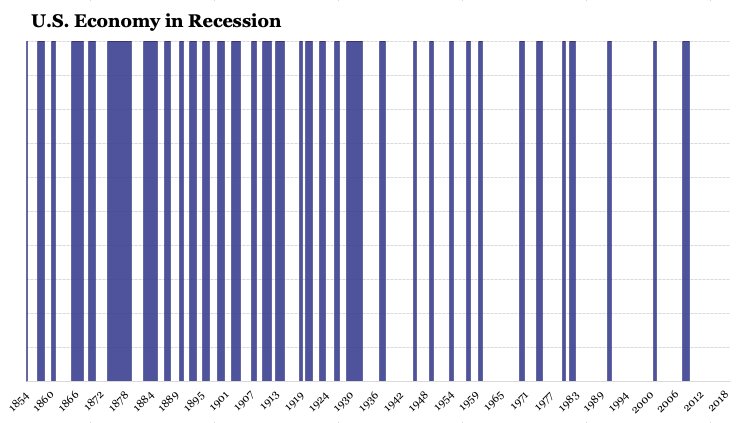Recessions: It’s Been a While
It’s been a while since we’ve had a recession:

That’s not a new trend. The average time between recessions has grown from about two years in the late 1800s to five years in the early 20th century to eight years over the last half-century.
It’s been 11 years since the last recession began in Dec. 2007. That’s the longest we’ve gone without starting a new recession ever, going back to before the Civil War.
I’ve heard theories on why that is. One is that the Fed is better at managing the business cycle, or at least extending it. Another is that heavy industry is more prone to boom-and-bust overproduction than the service industries that dominated the last 50 years.
No one has any idea how long this cycle can go. Australia hasn’t had a recession in 28 years. The rule of thumb is that unless you predicted the expansion would last this long you don’t get to predict when or how it will end. Which means basically no one gets to predict when or how it will end.
But whenever it does, for whatever reason, I’m confident in a couple things.
1. Some will assume it has to be as bad as 2008. There’s a whole generation whose recession experience is just the dot-com crash and the 2008 meltdown. I’m part of it. So it’s easy to look past the fact that most downturns don’t lead to tech stocks falling 70%, unemployment going to 10%, and the financial system nearing collapse. None of that is normal or common. A recession in 1970 saw the unemployment rate peak at 6%. In 1961 it was about 7%. 1954, 5.9%. Stocks fell a little over 10% during the 1954 recession, and about 15% during the 1958 downturn. The next one could be as bad as the last one. It could be worse. But when all you’ve experienced is a bludgeon it’s hard to remember that the next hit could just be a little smack.
2. It’s been a while since the last recession, so the next one will feel worse than it is. I used to live in Lake Tahoe and Seattle. It doesn’t snow often in Seattle. So when it does, 2 inches will shut the city down. But Tahoe can get 2 feet overnight and no flinches, no one is late to work, because it deals with it so often. Same with recessions. Going a decade without a recession means there are whole industries that have never experienced a trajectory that wasn’t up and to the right. They’re going to panic even if the next recession is mild, because it will upend their assumptions. This is especially true for people and businesses and industries whose value relies on people believing in a story vs. tangible results. Stories melt fast when the trajectory changes.
3. No matter what you do for a living, how you invest, what you invest in, or where you live, there will be opportunities. That’s always the case.